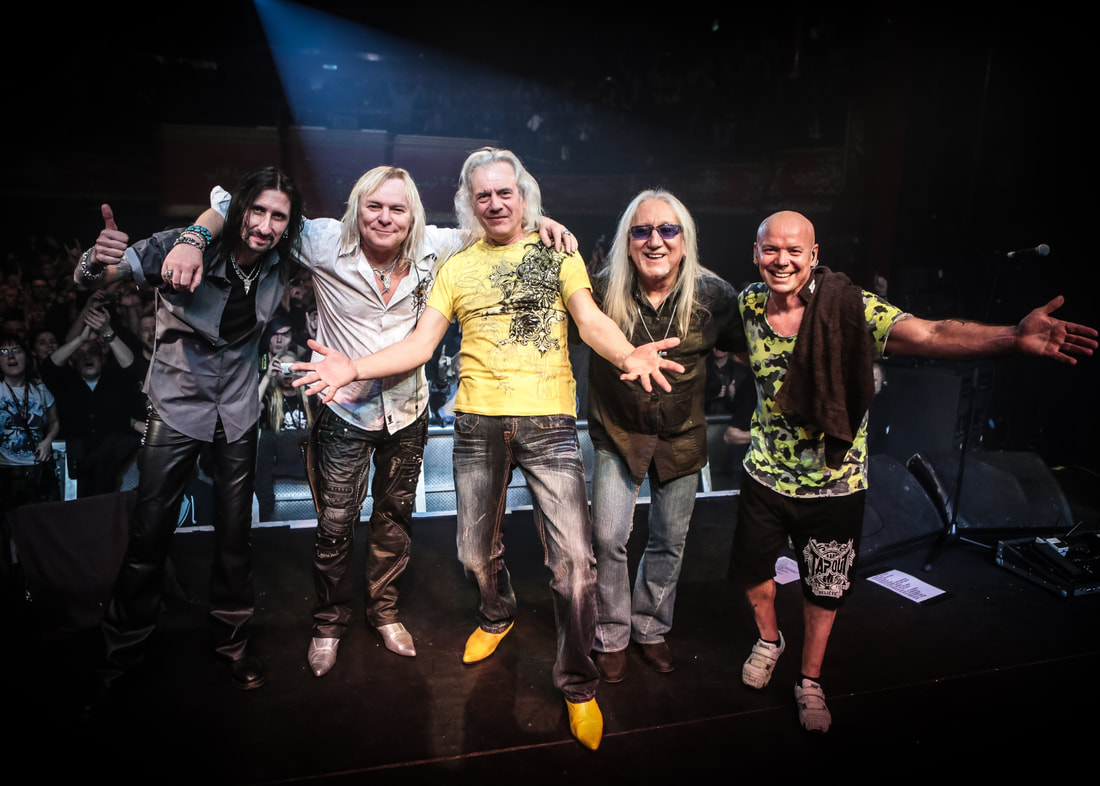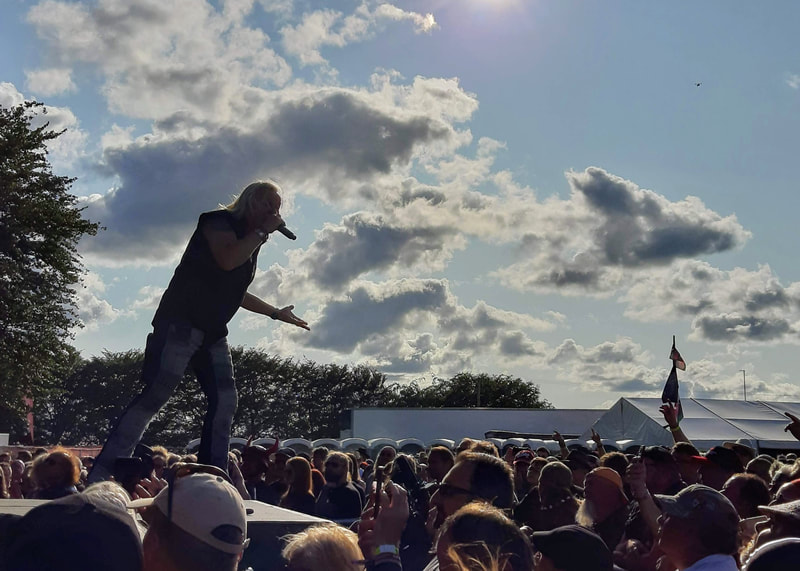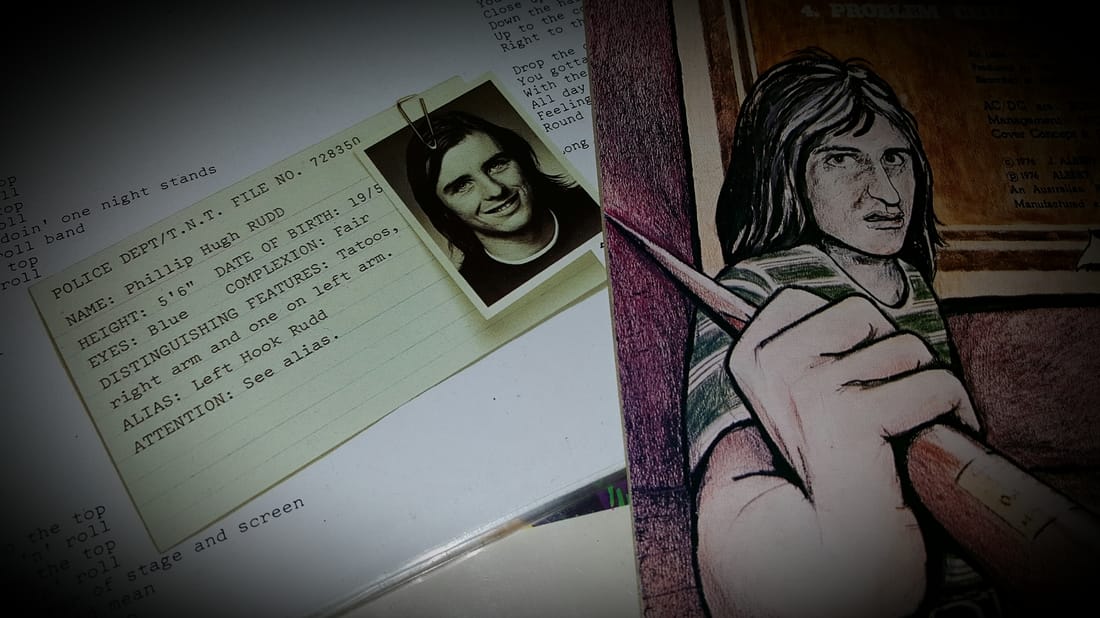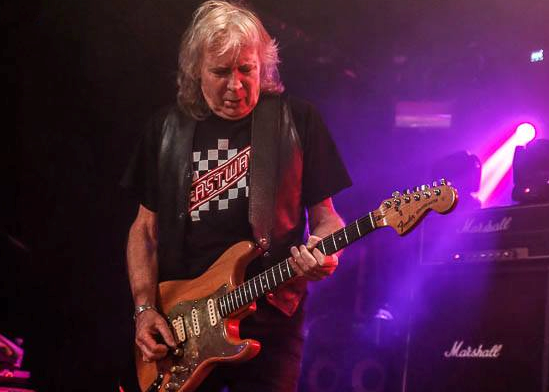|
Just shy of an incredible fifty years into their career, Uriah Heep are one of rocks true originators. Leviathans of the seventies, they morphed in the eighties, survived the nineties, and came out stronger in the 2000s. Currently touring 2018’s ‘Living the Dream’, the band are in the planning stages for next year’s mammoth five-decade milestone celebration. We caught up with band leader Mick Box and singer Bernie Shaw at Steelhouse Festival, for a chat about all of the above. Outsider; Eamon O’Neill.
Hi guys, how are you today?
Bernie Shaw: Absolutely amazing; adrenalized, and ready for the show. I’ve seen the crowd, they’re up for it, so, it’s going to be good. There’s a great line-up tonight. Mick Box: I’m good, mate. Happy days! The sun’s shining, so you just want to plug in and get rocking now. You’re the longest serving vocalist the Uriah Heep has ever had, by some way Bernie. BS: Yep, and still doing it. It’s 32 years for me, and counting. Mick, what was it like introducing Bernie to the band back in 1987, after going through so many changes? MB: It didn’t seem any different to me. I’ve always been a firm believer that if you get good musicians, you get good songs, and it’ll all be good. And that’s proved to be right. The first album that you made together was ‘Raging Silence’, which has a little more of a polished sheen to it. BS: It had a very American-ish sound, yeah. MB: It was indicative of the time, to be honest. I think the recording industry was dictating how everything should be sounding and listened to and heard. They went for perfection, and bands were taking four months to get a drum sound, a snare sound and stuff like that, and taking a year to make an album. It was all a bit silly to me, because I think a lot of the time, in search of perfection, you lose all the magic that was there in the first place. So, yeah it was that time, but if you didn’t follow that path, you kind of got lost behind, because that’s how people wanted to hear things. After the release of the follow-up ‘Different World’ in 1991, the band hit a period where it was much leaner for you, in terms of releases. MB: We had a break simply because the industry fell to pieces. It was nothing to do with the band at all. We’d left our record company, and exactly at that time the internet came into play, and record companies started disappearing. They attacked Napster back in those days, and they found out there was thousands of Napsters, so record companies started disappearing, folding, amalgamating, getting smaller, and we just couldn’t find a home. So we did what we do best, we went out and played live, and released live DVDs and things until it settled down and we found a home. Then we came back with a big bang; ‘Wake The Sleeper’ [2008], and we’ve been here ever since. ‘Wake the Sleeper’ was a title that was very much a statement, wasn’t it? MB: We’d been the sleeping giants for the best part of ten years waiting for the industry to sort itself out, yeah. There have been a number of very strong releases since them including this year’ ‘Living The Dream’; you must feel like you’ve found your place again. BS: I think we’re very happy with ourselves as a band; Mick and Phil [Lanzon, keyboards], as song writers, and we’ve got Jay Rushton on board now as a new producer that’s given us a new lease of life sonically. It’s such a strong team now, even with the management. There’s no stopping ahead of us. It’s a really smooth-oiled machine now, and everything’s running on four cylinders. Mick, you’ve built a legacy, but is it nice to have the current line-up that has endured with minimal changes for the last three decades?
MB: I think with bands it’s all about chemistry. With this band as we stand now, we’ve got the chemistry that we had in the heyday, so yeah, I’m very, very happy about that. Being in a band is not just making music, playing music, and doing anything else; it’s being off the road, enjoying each other’s company, and it’s like a team, a family. It’s your family away from the family, because we spend nearly a hundred and fifty shows a year away. BS: Yeah, two hundred days a year away from home, a hundred / hundred and twenty concerts, so I see Mick more than I see my wife. Of course, you suffered the loss of long time bassist Trevor Bolder in 2013. MB: It was a very, very sad time, because it came very quickly, and he went down very quickly. And funny enough, he was coming back with his health at one point where we felt; “Oh, he’s going to come back and be fine”, and unfortunately then he took a twist, and he left us, which was very, very sad. So it was a very big blow, but, you know, while he was ill we were working with Dave Rimmer, our present bass player, and we’re very happy to have him, and Trevor sanctioned that, which was really nice. Dave came in, and he’s brought a nice energy into the band; he’s brought some stage presence to the band, and he fits in with us socially, as well as professionally, so it’s really good. You also lost Lee Kerslake, in 2007, whose health problems have been well-publicised. MB: Yeah, he’s struggling a lot, but he’s proving a strong lad, because they gave him a certain time and he keeps proving them wrong. He keeps fighting back, and he’s a true fighter. Stepping away from Uriah Heep was something that was reportedly a very difficult thing for Lee to do. MB: Well, it’s something I had to put in his head to make it happen, because I could see it on the road, and the last thing I wanted ever, was to open a bedroom door on tour and find something not quite right. And I just felt that with the schedules we had in place, he needed time to get off the train, get off the roundabout, and try and sort his health issues out, and he did. The band have had released twenty-five studio albums now; what would you say are the stand outs for you? MB: It’s a very hard thing to say because, you know, there’s been markers, of course, like ‘Demons and Wizards’ [1972] was the album that took us onto the world’s stage, but then you go back to our first album [‘...Very 'Eavy ...Very 'Umble’ (1970)] which created all the start of everything, and then you get all the progressive rock things we went into with ‘Salisbury’ [1971], and then ‘Look at Yourself’ [1971] which had ‘July Morning’ on it, which is a mainstay in our set for many years. But you know, ‘Demons and Wizards’ with ‘Easy Livin’ really took us onto the world’s stage, and it just great and grew and grew. And then, of course, when we did ‘Abominog’ [1982], which went Top 40 in America, and that went huge too, so we’ve had so many highs and troughs. But I think it’s the strength in character of the band that we get through all those highs and lows and come out fighting strong again. What about for you Bernie; you’ve recorded quite a few albums with the band? BS: The thing is, each one has its own strength. You can’t say; “Oh, that was a poor album”; they all had something special at that time. Like, right now, when people say; “What’s your favourite album?”, I have to say ‘Living the Dream’. With songs like ‘Grazed by Heaven’ to sing every night, it’s got so much energy, it’s got a new sound. But ‘Wake the Sleeper’ for me, was one of those pinnacle points. Really, the song writing on there, I just really got my teeth into. Lyrically, and melodically, it’s a really strong album for me. MB: And then the fans love ‘Sea of Light’ [1995], because they saw that as almost, a return to the powerful old days. ‘Living the Dream’ was released last year; Have you been pleased with the response it received?
MB: Yeah, when you get fans and the media alike saying it’s one of the best albums of the band’s career - and we’re coming up to our fiftieth anniversary next year - it’s a great feather in our cap. We’re still being creative, and creating, and that’s the response. Have you plans to celebrate the band’s fiftieth anniversary in place? BS: Absolutely. MB: I don’t think there’s enough alcohol in the world yet to warrant that celebration! But yeah, we’ll be able to celebrate in many, many ways. But if I’m absolutely truthful, our management’s desk is full of ideas, and he’s working through them now to see which ones will come to fruition. The one thing we won’t be doing is looking back too much, because although we’re very proud of our history, we’re a forward-looking band, and I think that’s the most important thing to make on our fiftieth anniversary; that the band is still alive and kicking, is creative, and writing great music. Back in 2010, the band appeared at High Voltage festival in London, playing the whole of ‘Demons and Wizards’. MB: Well, to do that in order was strange. The promotor requested it and we did it, but it was very strange to do. BS: To do ‘Easy Livin’ second or third was really strange, but the whole thing was only 45 minutes because that’s what the organisers wanted. MB: It got great reports and everybody loved it, but as you say, a list of songs on an album doesn’t necessarily work on stage. It’s a different dynamic. Finally, if you had to do it again, what album would you choose to play in full? MB: Easy; ‘Living the Dream’. BS: I would go between ‘Living the Dream’ and ‘Wake the Sleeper’. They both have; a starting, and a middle, and an ending; it’s got a completeness to it. I listen to a lot of vinyl at home rather than CD, and I’ll put the needle on, and I’ll let it go through the whole album on both those. They just take you through a journey. Like this interview? Like us on Facebook and follow us on Twitter for regular updates & more of the same. |
|
Uriah Heep
"We’re a forward-looking band, and I think that’s the most important thing to make on our fiftieth anniversary; that the band is still alive and kicking, is creative, and writing great music." - Mick Box.
© 2016 - 2024 eonmusic.co.ukContact: [email protected]
|




